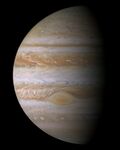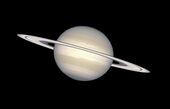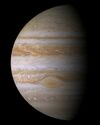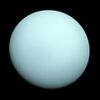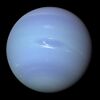Astronomy:List of missions to the outer planets
A total of nine spacecraft have been launched on missions that involve visits to the outer planets; all nine missions involve encounters with Jupiter, with four spacecraft also visiting Saturn. One spacecraft, Voyager 2, also visited Uranus and Neptune. The nine missions include two, Ulysses and New Horizons, whose primary objectives were not outer planets, but which flew past Jupiter to gain gravity assists en route to a polar orbit around the Sun (Ulysses), and to Pluto (New Horizons). Pluto was considered a planet at the time that New Horizons launched. Cassini–Huygens also flew past Jupiter for a gravity assist on its Mission to explore Saturn.
Only three of the missions to the outer planets have been orbiters: Galileo orbited Jupiter for eight years, while Cassini orbited Saturn for thirteen years. Juno has been orbiting Jupiter since 2016.
Summary of missions to the outer Solar System
System Spacecraft
|
Jupiter Jupiter trojans |
Saturn | Uranus Uranus trojans |
Neptune Neptune trojans |
Distant minor planets |
|---|---|---|---|---|---|
| Pioneer 10 | 1973 flyby Jupiter and moons |
||||
| Pioneer 11 | 1974 flyby Jupiter and moons |
1979 flyby Saturn and moons |
|||
| Voyager 1 | 1979 flyby Jupiter and moons |
1980 flyby Saturn and moons |
|||
| Voyager 2 | 1979 flyby Jupiter and moons |
1981 flyby Saturn and moons |
1986 flyby Uranus and moons |
1989 flyby Neptune and moons |
|
| Ulysses | 1992, 2004 gravity assist Jupiter |
||||
| Galileo | 1995–2003 orbiter Jupiter and moons 1995 atmospheric Jupiter |
||||
| Cassini–Huygens | 2000 gravity assist Jupiter and moons |
2004–2017 orbiter Saturn and moons 2005 lander Titan |
|||
| New Horizons | 2007 gravity assist Jupiter and moons |
2015 flyby Pluto and moons 2019 flyby 486958 Arrokoth | |||
| Juno | 2016–2025 orbiter Jupiter |
||||
| Lucy | 2027– flyby mission (launched 2021) 3548 Eurybates 15094 Polymele 11351 Leucus 21900 Orus 617 Patroclus |
||||
| Jupiter Icy Moons Explorer | 2031– orbiter mission (launched 2023) Jupiter and Ganymede |
For proposed and planned future missions see: List of proposed Solar System spacecraft
Jupiter
Eight spacecraft have been launched to explore Jupiter, with two other spacecraft making gravity-assist flybys.
New Horizons, although eventually targeting Pluto, used Jupiter for a gravity assist and had an extensive almost half year observation campaign of Jupiter and its moons (hence it is counted in the eight).[1]
| Spacecraft | Launch date | Operator | Mission | Outcome | Remarks | Carrier rocket |
|---|---|---|---|---|---|---|
| Pioneer 10 | 3 March 1972[2] | NASA United States |
Flyby | Successful[3] | Closest approach at 02:25 UTC on 4 December 1973[4] | Atlas SLV-3C Centaur-D[5] |
| Pioneer 11 | 6 April 1973[2] | NASA United States |
Flyby | Successful[6] | Closest approach at 05:22 UTC on 3 December 1974, later flew past Saturn[7] | Atlas SLV-3D Centaur-D1A[5] |
| Voyager 2 | 20 August 1977[2] | NASA United States |
Flyby | Successful | Closest approach at 22:29 on 9 July 1979, later flew past Saturn, Uranus and Neptune[8] | Titan IIIE Centaur-D1T[9] |
| Voyager 1 | 5 September 1977[2] | NASA United States |
Flyby | Successful | Closest approach at 12:05 UTC on 5 March 1979, later flew past Saturn[10] | Titan IIIE Centaur-D1T[9] |
| Galileo | 18 October 1989[2] | NASA United States |
Orbiter/Atmospheric | Successful[11] | Atmospheric probe entered atmosphere at 22:04 UTC on 7 December 1995 and operated for 57 minutes; main spacecraft entered orbit at 00:27 UTC on 8 December.[12] Spacecraft was deorbited on 21 September 2003, impacting Jupiter's atmosphere at 18:57:18 UTC.[13] | Space Shuttle Atlantis STS-34 / IUS[14] |
| Ulysses | 6 October 1990[2] | NASA United States / ESA |
Gravity assist | Successful | Flyby on 8 February 1992 to reach a high-inclination heliocentric orbit.[15] Also made a distant incidental flyby on 4 February 2004[16] | Space Shuttle Discovery STS-41 / IUS[17] |
| Cassini–Huygens | 15 October 1997[2] | NASA United States / ESA |
Gravity assist | Successful | Flyby on 30 December 2000 en route to Saturn[18] | Titan IV(401)B Centaur-T[19] |
| New Horizons | 19 January 2006[2] | NASA United States |
Gravity assist[20] Major observation campaign from Jan-June[1] |
Successful | Flyby on 28 February 2007 (closest approach at 05:43:40[21]) en route to Pluto[22] | Atlas V 551[20] |
| Juno | 5 August 2011[2] | NASA United States |
Orbiter of Jupiter | Operational | Entered orbit 4 July 2016[23] | Atlas V 551[24] |
| JUICE | 14 April 2023 | ESA | Orbiter of Jupiter Orbiter of Ganymede |
Enroute | Ariane 5 ECA |
- Missions whose primary objectives were not related to the exploration of Jupiter are indicated in grey
Saturn
Four spacecraft have visited Saturn; Pioneer 11, Voyager 1 and Voyager 2 made flybys, while Cassini–Huygens entered orbit, and deployed a probe into the atmosphere of Titan.
| Spacecraft | Launch date | Operator | Mission | Outcome | Remarks | Carrier rocket |
|---|---|---|---|---|---|---|
| Pioneer 11 | 6 April 1973[2] | NASA United States |
Flyby | Successful | Closest approach on 1 September 1979 at 16:31 UTC[7] | Atlas SLV-3D Centaur-D1A[5] |
| Voyager 2 | 20 August 1977[2] | NASA United States |
Flyby | Successful | Closest approach at 01:21 UTC on 26 August 1981, later flew past Uranus and Neptune[8] | Titan IIIE Centaur-D1T[9] |
| Voyager 1 | 5 September 1977[2] | NASA United States |
Flyby | Successful | Closest approach on 12 November 1980 at 23:45 UTC[10] | Titan IIIE Centaur-D1T[9] |
| Cassini | 15 October 1997[2] | NASA United States |
Orbiter | Successful | Entered orbit 1 July 2004; mission concluded on 15 September 2017[25] | Titan IV(401)B Centaur-T[19] |
| Huygens | 15 October 1997[2] | ESA / ASI Italy |
Titan lander | Successful | Deployed from Cassini; landed on Titan at 10:13 UTC on 14 January 2005 | Titan IV(401)B Centaur-T[19] |
Uranus
Voyager 2 is the only spacecraft to have visited Uranus, making a single flyby as part of its grand tour of the outer planets.
| Spacecraft | Launch date | Operator | Mission | Outcome | Remarks | Carrier rocket |
|---|---|---|---|---|---|---|
| Voyager 2 | 20 August 1977[2] | NASA United States |
Flyby | Successful | Closest approach at 17:59 UTC on 24 January 1986, later flew past Neptune[8] | Titan IIIE Centaur-D1T[9] |
Neptune
Voyager 2 is the only spacecraft to have visited Neptune, making a single flyby as part of its grand tour of the outer planets.
| Spacecraft | Launch date | Operator | Mission | Outcome | Remarks | Carrier rocket |
|---|---|---|---|---|---|---|
| Voyager 2 | 20 August 1977[2] | NASA United States |
Flyby | Successful | Closest approach at 03:26 UTC on 25 August 1989[8] | Titan IIIE Centaur-D1T[9] |
See also
- List of trans-Neptunian objects (numbered, excludes comets, see Trans-Neptunian object)
- List of missions to the Moon
- List of missions to Venus
- List of missions to Mars
- List of proposed Solar System spacecraft
- Interstellar probe
- Kuiper belt (approx. 30-50 AU, Pluto largest of this group)
- List of extraterrestrial orbiters
- List of artificial objects leaving the Solar System
References
- ↑ 1.0 1.1 NASA Jupiter Press Kit (pdf)
- ↑ 2.00 2.01 2.02 2.03 2.04 2.05 2.06 2.07 2.08 2.09 2.10 2.11 2.12 2.13 2.14 2.15 McDowell, Jonathan. "Launch Log". Jonathan's Space Page. http://planet4589.org/space/log/launchlog.txt. Retrieved 6 January 2013.
- ↑ "Solar System Exploration - Pioneer 10". NASA. http://solarsystem.nasa.gov/missions/profile.cfm?Sort=Target&Target=Jupiter&MCode=Pioneer_10. Retrieved 6 January 2013.
- ↑ "Solar System Exploration - Pioneer 10". NASA. http://solarsystem.nasa.gov/missions/profile.cfm?MCode=Pioneer_10&Display=ReadMore. Retrieved 6 January 2013.
- ↑ 5.0 5.1 5.2 Krebs, Gunter. "Pioneer 10, 11, H". Gunter's Space Page. http://space.skyrocket.de/doc_sdat/pioneer-1011.htm. Retrieved 6 January 2013.
- ↑ "Solar System Exploration - Pioneer 11". NASA. http://solarsystem.nasa.gov/missions/profile.cfm?Sort=Target&Target=Jupiter&MCode=Pioneer_11. Retrieved 6 January 2013.
- ↑ 7.0 7.1 "Solar System Exploration - Pioneer 11". NASA. http://solarsystem.nasa.gov/missions/profile.cfm?Sort=Target&Target=Jupiter&MCode=Pioneer_11&Display=ReadMore. Retrieved 6 January 2013.
- ↑ 8.0 8.1 8.2 8.3 "Solar System Exploration - Voyager 2". NASA. http://solarsystem.nasa.gov/missions/profile.cfm?Sort=Target&Target=Jupiter&MCode=Voyager_2&Display=ReadMore. Retrieved 6 January 2013.
- ↑ 9.0 9.1 9.2 9.3 9.4 9.5 Krebs, Gunter. "Voyager 1, 2". Gunter's Space Page. http://space.skyrocket.de/doc_sdat/voyager.htm. Retrieved 6 January 2013.
- ↑ 10.0 10.1 "Solar System Exploration - Voyager 1". NASA. http://solarsystem.nasa.gov/missions/profile.cfm?Sort=Target&Target=Jupiter&MCode=Voyager_1&Display=ReadMore. Retrieved 6 January 2013.
- ↑ "Solar System Exploration - Galileo". NASA. http://solarsystem.nasa.gov/missions/profile.cfm?Sort=Target&Target=Jupiter&MCode=Galileo. Retrieved 6 January 2013.
- ↑ "Solar System Exploration - Galileo". NASA. http://solarsystem.nasa.gov/missions/profile.cfm?Sort=Target&Target=Jupiter&MCode=Galileo&Display=ReadMore. Retrieved 6 January 2013.
- ↑ "Solar System Exploration - Galileo - Dates". NASA. http://solarsystem.nasa.gov/missions/profile.cfm?Sort=Target&Target=Jupiter&MCode=Galileo&Display=Dates. Retrieved 6 January 2013.
- ↑ Krebs, Gunter. "Galileo". Gunter's Space Page. http://space.skyrocket.de/doc_sdat/galileo.htm. Retrieved 6 January 2013.
- ↑ "Solar System Exploration - Ulysses". NASA. http://solarsystem.nasa.gov/missions/profile.cfm?Sort=Target&Target=Jupiter&MCode=Ulysses&Display=ReadMore. Retrieved 6 January 2013.
- ↑ "Ulysses - Encounter Trajectory". NASA Jet Propulsion Laboratory. Archived from the original on 16 February 2013. https://web.archive.org/web/20130216040047/http://ulysses.jpl.nasa.gov/science/Encounter.html. Retrieved 6 January 2013.
- ↑ Krebs, Gunter. "Ulyssees". Gunter's Space Page. http://space.skyrocket.de/doc_sdat/ulysses.htm. Retrieved 6 January 2013.
- ↑ "Solar System Exploration - Cassini - Dates". NASA. http://solarsystem.nasa.gov/missions/profile.cfm?Sort=Target&Target=Jupiter&MCode=Cassini&Display=Dates. Retrieved 6 January 2013.
- ↑ 19.0 19.1 19.2 Krebs, Gunter. "Cassini". Gunter's Space Page. http://space.skyrocket.de/doc_sdat/cassini.htm. Retrieved 6 January 2013.
- ↑ 20.0 20.1 Krebs, Gunter. "New Horizons". Gunter's Space Page. http://space.skyrocket.de/doc_sdat/new-horizons.htm. Retrieved 6 January 2013.
- ↑ Muller, Daniel. "New Horizons Full Mission Timeline". http://www.dmuller.net/spaceflight/mission.php?mission=newhorizons&appear=black&mtype=scet&showimg=yes&dispwide=no. Retrieved 6 January 2013.
- ↑ "New Horizons targets Jupiter kick". BBC News. 19 January 2007. http://news.bbc.co.uk/1/hi/technology/6279423.stm. Retrieved 6 January 2013.
- ↑ Amos, Jonathan (4 July 2016). "Juno probe enters into orbit around Jupiter". BBC News. https://www.bbc.com/news/science-environment-36710768. Retrieved 5 July 2016.
- ↑ Krebs, Gunter. "Juno (New Frontiers 2)". Gunter's Space Page. http://space.skyrocket.de/doc_sdat/juno.htm. Retrieved 6 January 2013.
- ↑ "Solar System Exploration - Cassini". NASA. http://solarsystem.nasa.gov/missions/profile.cfm?Sort=Target&Target=Jupiter&MCode=Cassini. Retrieved 6 January 2013.
 |

